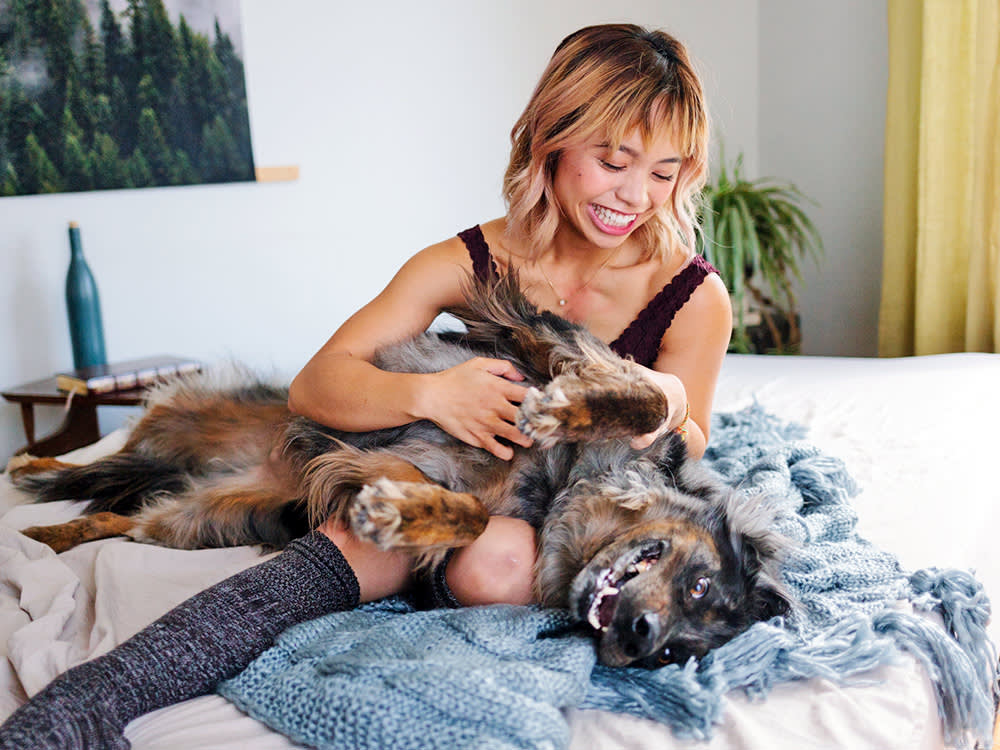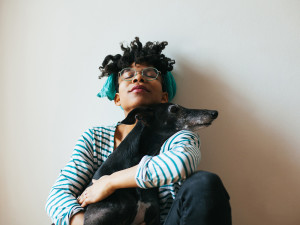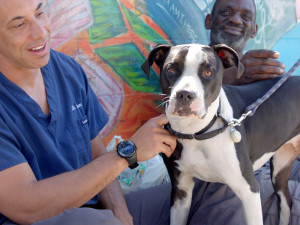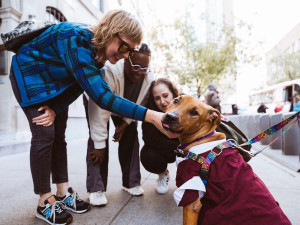These Organizations Are Helping Domestic Abuse Survivors Stay With Their Pets
Fostering a pet can be one way to help a person in need escape a dangerous situation.
These days, it’s become practically indisputable that having a pet will positively impact your life. In addition to lending us emotional support, they may reduce our anxiety, stress, and depression. This is especially true in our darkest moments. And it’s why several organizations have developed foster programs that ultimately reunite survivors of domestic violence (DV) with their pets after they leave a dangerous situation, as well as human-pet cohabitation shelters so they don’t have to be separated in the first place.
Per the National Domestic Violence Hotlineopens in new tab, 65 percent of survivors delay leaving their situation because they’re concerned for their pets. A major reason for this is the feeling that they cannot survive without the unconditional love and (in many cases) protection these animals provide them. But another significant factor is that most abusers — specifically 71 percent of themopens in new tab, according to the National Coalition Against Domestic Violence — will threaten, hurt, or kill these pets.
Such risks can make someone feel even more powerless, trapping them in a horrible situation. “When people are in abusive relationships, their social network can become very limited, because their abuser won’t let them see friends and family. When they have a pet in the home, that pet becomes their life,” explains Jake De Vera, director of Development & Community-Based Programs at Women’s Advocatesopens in new tab. Despite the nonprofit’s name, their services are gender inclusive, though De Vera estimates more than 95 percent of the people they help end up being cisgender women.
“Pets do help decrease physical signs of stress,” adds Claire Coughlin, director of the Companion Animal Program at the Animal Welfare Instituteopens in new tab. “Children and adults may be more likely to discuss abuse in the presence of a beloved pet, because they do provide that level of comfort that they need.”
How much do you spend on your pet per year?
Crucial resources for pet parents who are DV survivors
Coughlin and her Washington D.C.-based Safe Havens for Petsopens in new tab team regularly update an easily searchable national databaseopens in new tab that offers a wealth of foster programs and animal-friendly shelters to DV survivors. The site also details statutes and the actual paperwork for animal protective ordersopens in new tab — and they do this state by state. This insight can be pivotal. “Sometimes animals can be categorized as property, so that’s a consideration,” Coughlin says. “And if a survivor gets a protective order and their pet is included [in it] — maybe the pet was left behind — some of these statutes allow for law enforcement to assist in retrieving the animal.”
Safe Havens for Pets is also making it easy for any animal lover to help someone in a DV situation, thanks to a database that facilitates fostering a pet in needopens in new tab. (As a temporary pet parent, your safety is also paramount, so your identity will be kept anonymous, and typically a local rescue will reunite the pet you foster with their survivor parent.) If you’d like to start your own DV rescue program, the organization also keeps a running list of grantsopens in new tab, among them their own AWI Safe Havens for Pets Desert Grantopens in new tab, which is awarded to organizations in areas with above-average rates of DV hotline calls, but a below-average number of resources.
Where Safe Havens for Pets is a stellar example of quickly pointing DV survivors toward the resources they urgently need, the Minneapolis-based Women’s Advocates has become a gold standard of what local advocacy can look like. Women’s Advocates started in 1974 as a resource to place women experiencing abuse in shelters. In March 2023, after noticing the pressing need to help survivors with pets, they launched a DV foster program that likewise offers legal advocacy.
Just a year later, they teamed with other local anti-abuse nonprofits, Cornerstoneopens in new tab and Tubmanopens in new tab, to create the Minnesota Pet Foster Coalition. That coalition partners with animal welfare organizations to offer DV fosters essentials such as food, veterinary care, and spaying-neutering, alongside addressing more challenging needs like training and behavioral support for pets — this includes a kennel willing to take dogs opens in new tab who’ve become reactive because of trauma. The Department of Justice’s Office for Victims of Crime even awarded Women’s Advocates a $100,000 grant last year, which covered about one-fifth of the Foster Coalition’s expenses. For the rest, they rely heavily on small private donorsopens in new tab.
A future of growing support
The success of these initiatives has inspired Women’s Advocates to get even more ambitious, recently launching their capital project. “We have just purchased two 28-unit apartment buildings that we’re renovating to be one 19-unit facility, and it’s going to be a co-sheltering facility,” De Vera explains.
They have raised roughly 65 percent of funds for this $14.25 million project, thanks to private donations and a large grant from the State of Minnesota. (If you’d like to pitch in, you can donate hereopens in new tab.) “Whether you’re a human or an animal, we’ll keep everyone together, De Vera says. “And as of right now, we aren’t putting any limits — I mean, within reason — on the types of pets. So birds, lizards, hamsters, all of the above can be cared for, too.” They hope to open this pet-parent sanctuary in the fall of 2026.
“It’s an exciting time to be here — we’re helping a lot of people,” De Vera says. “Just to be there when people get reunited with their pets, to see them come together with their pet after finally getting a house or an apartment by themselves, it’s really an incredible thing.”










